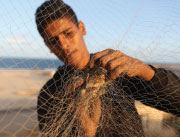Waiting in the Wings


BORDER LINES The profits from goldfinch smuggling outweigh the risk of fines — unless those little songbirds die on the way. “There is a market and there is money behind this hunting. There is a strong motivation for these people to come back and take the risk” (Photos: Flash90)
N atan Bainosowitz a district inspector for Israel’s Nature and Parks Authority was on patrol in the Arab-populated Wadi Ara region when he heard the clear and constant chirping of goldfinches those highly popular but endangered birds known for their special song. He followed the sound thinking that he’d find a cache of netted birds trapped by a local black-market bird trader. But when he reached the source of the chirping he found not some coveted songbirds but rather a small digital recorder. It was emitting a constant chirp in order to attract live goldfinches.
Bainosowitz picked it up and angrily switched it off but the episode wasn’t over. A short distance away he noticed two goldfinches struggling to fly. These charming birds a protected natural resource whose entrapment is illegal were tied to the branch of a thorn bush by a greedy trapper who hoped the birds’ desperate cries would attract their feathered friends.
Not far from the birds was a net attached to a cord an obvious trap set up by someone close by waiting to pounce on his prey. Bainosowitz followed the cord hoping to get to the hunter but when he reached the end all he found were orange peels and a bottle of water. Nearby was a covered cage filled with goldfinches the morning’s loot. This time the trapper got away and all that was left for Bainosowitz to do was to free the birds. But he knew this was just a temporary measure: Goldfinch smuggling was big business and it wasn’t going to end just because one trapper was scared off.
Illegal goldfinch hunters — primarily Israeli and Palestinians Arabs — can get rich by trapping the small birds and selling them. A wild goldfinch sells for about 150 shekels ($39) and the much in-demand goldfinch-canary hybrid can fetch up to $400. There are some songbird enthusiasts who will give anything to be able to claim this song for themselves.

When the smugglers rolled up their pants customs officials found pockets of netting sewn into the fabric — with goldfinches stuffed up and down the length of their legs
“There are a lot of bird lovers out there” says Avi Robbins chairman of the Israel Federation of Bird Breeders. “And some of us will do crazy things for birds. As for the goldfinch first of all it’s a gorgeous bird and second its singing is just a pleasure for the senses. In my opinion that’s a recipe for disaster.”
That’s because if there’s something breeders love more than the goldfinch it’s the crossbreed between a male goldfinch and a female canary. The canary is a pretty bird with a beautiful song and the combination of these two birds creates a song that according to Robbins borders on divine. In Israel the crossbreeding takes place primarily in the Arab sector where both the goldfinch and the crossbreed called a male mule are very popular. In the local vernacular this hybrid is called a “bandok ” which literally means mamzer.
“Genetically ” says Robbins “the bandok combines the song of the canary with the pitch of the goldfinch and the result is something out of this world.” The problem is that the bandok like other crossbreeds cannot reproduce — and that means for every bandok there needs to be a supply of goldfinches. (Excerpted from Mishpacha Issue 653)
Oops! We could not locate your form.







